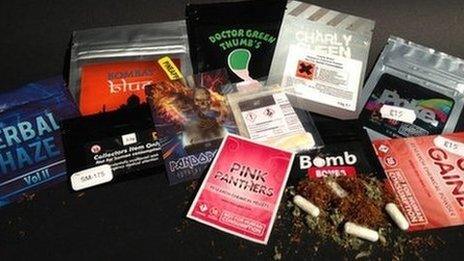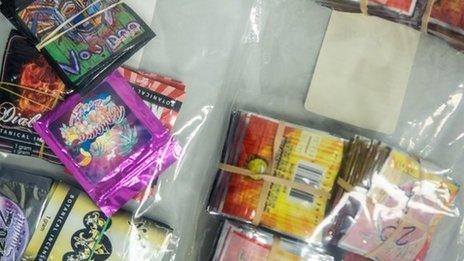'Law change needed' to stop sale of 'legal highs'
- Published

Deaths from "legal highs" have more than doubled in the past four years
A change in UK law is needed in order to stop "legal highs" being sold in shops, councils have said.
The Local Government Association (LGA) - which represents 400 councils - wants the government to adopt a similar approach to that taken in Ireland.
Instead of banning drugs on a case-by-case basis, Ireland has banned all "psychoactive" - brain altering - drugs and then exempted some such as alcohol.
The LGA says this is the only way to protect young people.
'Vigorous' laws needed
Deaths from so-called legal highs have more than doubled in the past four years - from 26 in 2009 to 60 last year.
Currently in the UK a decision on whether a product is allowed to be sold is made on a case-by-case basis.
The LGA says that when one product is banned the makers change the chemical compound slightly and can then sell it legally in shops - dubbed "headshops".
To stop this happening in Ireland a ban on all brain-altering drugs was made law in 2010, and then substances such as alcoholic drinks and tobacco were made exempt and allowed to be sold.
Councillor Ann Lucas, chairman of the LGA's safer and stronger communities board, said: "This is all about tackling the sellers.
"Legal high shops are becoming endemic to our high streets, which is why we are calling on the government to introduce robust and vigorous new laws to tackle them.
"The sooner we put these so-called headshops out of business for good, the better. A key priority is educating and informing younger people about the dangers and risks of these drugs and councils play a pivotal role in this."
'Notoriously difficult'
Director at Public Health England (PHE) Rosanna O'Connor said services needed to be "geared up" to account for changing patterns of drug use.
She said PHE was strengthening its own efforts to tackle use of new and emerging substances and was working with national and local partners to "raise awareness of the risks... prevent problems where possible and ensure treatment services are able to help people".
Ms O'Connor said she was monitoring the use and impact of newer drugs to "build a better picture of the scale of the problem" and would feed any information into a pan-European early warning system.
Councils spend about 30% - £830m a year - of their public health budget on drug and alcohol misuse, the LGA said.
Legal highs, which include substances called "Clockwork Orange", "Bliss" and "Mary Jane", have been directly linked to emergency hospital admissions including in mental health services, the LGA said.
Drug treatment charity Addaction said it was "notoriously difficult" to control legal highs because so much of their trade took place online.
"Any regulatory measures must be accompanied by education, support, advice and - in serious cases - specialist treatment," the charity said.
- Published12 February 2014

- Published20 May 2014
